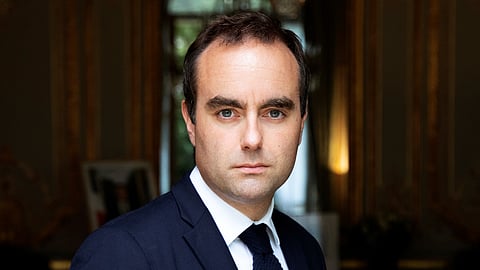

France's Prime Minister Sébastien Lecornu announced on Tuesday the suspension of the 2023 pension reform, a move designed to garner support from the Socialist Party and survive impending no-confidence votes.
The decision comes as Lecornu, reappointed last week after a brief resignation, navigates a fragmented parliament where no single bloc holds a majority.
This reform, which gradually raised the retirement age from 62 to 64, had been a cornerstone of President Emmanuel Macron's economic agenda but sparked widespread protests in 2023.
Lecornu addressed lawmakers during his policy speech, stating, “I will propose to parliament, starting this autumn, that we suspend the 2023 pension reform until the presidential election.”
He added, “No increase in the retirement age will take place from now until January 2028.”
The suspension is projected to cost €400 million in 2026 and €1.8 billion in 2027, benefiting 3.5 million people, with Lecornu emphasizing the need for offsetting financial measures.
France remains entrenched in its most severe political deadlock in decades, following Macron's 2024 snap elections that yielded a hung parliament divided among left-wing, far-right, and centrist factions.
The far-right National Rally and radical-left France Unbowed have filed no-confidence motions set for later this week, lacking the seats to succeed without Socialist or Green support.
The Greens confirmed their backing for a motion, while Socialist leader Boris Vallaud hailed the pension suspension as a victory for the left but stressed the importance of transforming pledges into actions.
Lecornu's predecessors, Michel Barnier and François Bayrou, were ousted over similar austerity disputes, underscoring the fragility of his position.
Macron has warned that a successful no-confidence vote would trigger parliament's dissolution and new elections.
Lecornu is racing to pass a 2026 austerity budget by year's end, targeting a deficit reduction below 5% of GDP to preserve national sovereignty.
France's debt-to-GDP ratio nears twice the EU's 60% limit, with last year's deficit at 5.8%, the bloc's third-highest after Greece and Italy.
Proposed measures include an exceptional contribution from major companies and high-net-worth individuals to fund public spending cuts.
Recent unrest has intensified, with September's Block Everything campaign leading to nationwide protests marked by barricades and clashes, followed by October strikes drawing 195,000 participants, including 24,000 in Paris, against budget austerity.
Lecornu urged his cabinet to prioritize breaking the impasse, as the eurozone's second-largest economy grapples with turmoil.